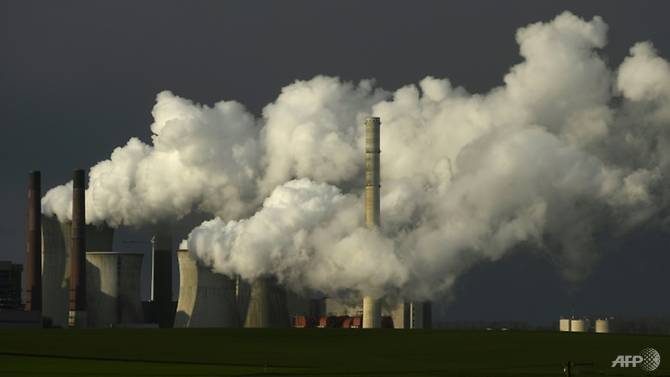May 28, 2025 | 09:12 GMT +7
May 28, 2025 | 09:12 GMT +7
Hotline: 0913.378.918
May 28, 2025 | 09:12 GMT +7
Hotline: 0913.378.918

More than 110 countries have committed to becoming carbon neutral by mid-century, including major greenhouse gas emitters such as Britain, Japan and South Korea. Photo: AFP
taking a tentative step towards promoting the idea and coordinating carbon reduction policies.
The move marked a massive shift from the previous four years when frmer US President Donald Trump's administration routinely opposed the mention of climate change as a global risk in such international statements.
The communique, issued on Saturday after a meeting of Group of 20 finance ministers and central bank governors in the Italian city of Venice, which is threatened by rising sea levels, inserted a mention of carbon pricing among a "wide set of tools" on which countries should coordinate to lower greenhouse gas emissions.
Such tools include investing in sustainable infrastructure and new technologies to promote decarbonization and clean energy, "including the rationalisation and phasing-out of inefficient fossil fuel subsidies that encourage wasteful consumption and, if appropriate, the use of carbon pricing mechanisms and incentives, while providing targeted support for the poorest and the most vulnerable", said the communique from the financial leaders of the world's 20 major economies.
The statement was issued just days before the European Union was scheduled to unveil a controversial carbon-adjustment border tax on goods from countries with high carbon emissions.
"It is the first time in a G20 communique you could have these two words 'carbon pricing' being introduced as a solution for the fight against climate change," French Finance Minister Bruno Le Maire told reporters. "We have been pushing very hard to have these two words ... introduced into a G20 communique."
Those efforts met strong US resistance for most of Trump's presidency, during which the United States quickly withdrew from the Paris climate agreement.
At a summit in Saudi Arabia in 2020, then-US Treasury Secretary Steven Mnuchin agreed to a G20 reference to climate change, but not as a downside risk to global growth. Instead, it was included in a reference to the Financial Stability Board’s work examining the implications of climate change for financial stability.
The carbon pricing mention on Saturday marks the influence of the Biden administration, which immediately rejoined the Paris agreement in January and has set out ambitious carbon reduction targets and clean energy and transportation investment plans.
But while supporting emissions reductions, US Treasury Secretary Janet Yellen called on Friday for better international coordination on carbon-cutting policies to avoid trade frictions.
The EU's carbon border adjustment mechanism would impose levies on the carbon content of imported goods in an effort to discourage "carbon leakage", the transfer of production to countries with less onerous emission restrictions. Critics of the measure worry that it could become another trade barrier without reducing emissions.
(Reuters)

(VAN) Vikas Rambal has quietly built a $5 billion business empire in manufacturing, property and solar, and catapulted onto the Rich List.

(VAN) Available cropland now at less than five percent, according to latest geospatial assessment from FAO and UNOSAT.

(VAN) Alt Carbon has raised $12 million in a seed round as it plans to scale its carbon dioxide removal work in the South Asian nation.

(VAN) Attempts to bring down the price of the Japanese staple have had little effect amid a cost-of-living crisis.

(VAN) Fourth most important food crop in peril as Latin America and Caribbean suffer from slow-onset climate disaster.

(VAN) Shifting market dynamics and the noise around new legislation has propelled Trouw Nutrition’s research around early life nutrition in poultry. Today, it continues to be a key area of research.

(VAN) India is concerned about its food security and the livelihoods of its farmers if more US food imports are allowed.